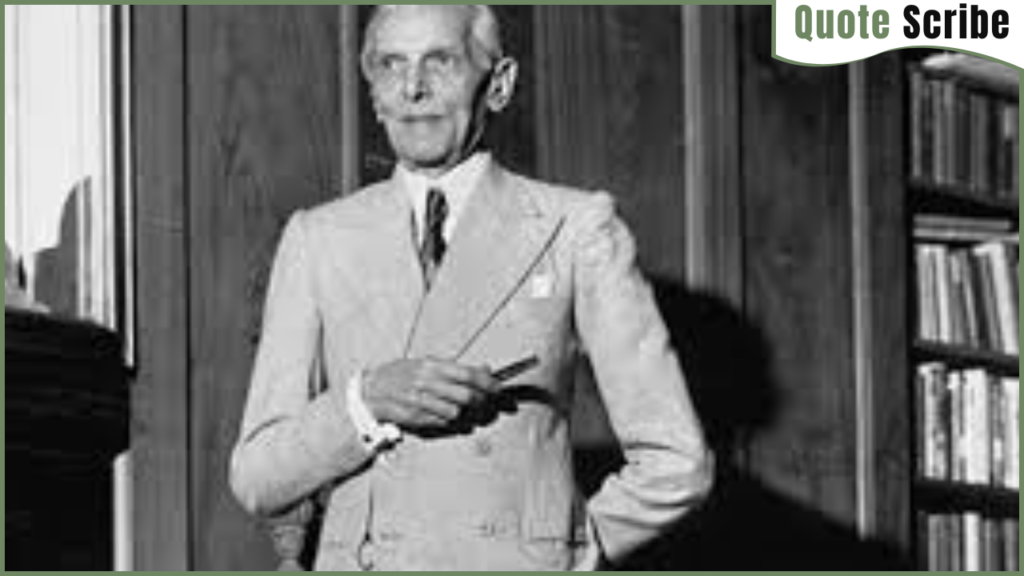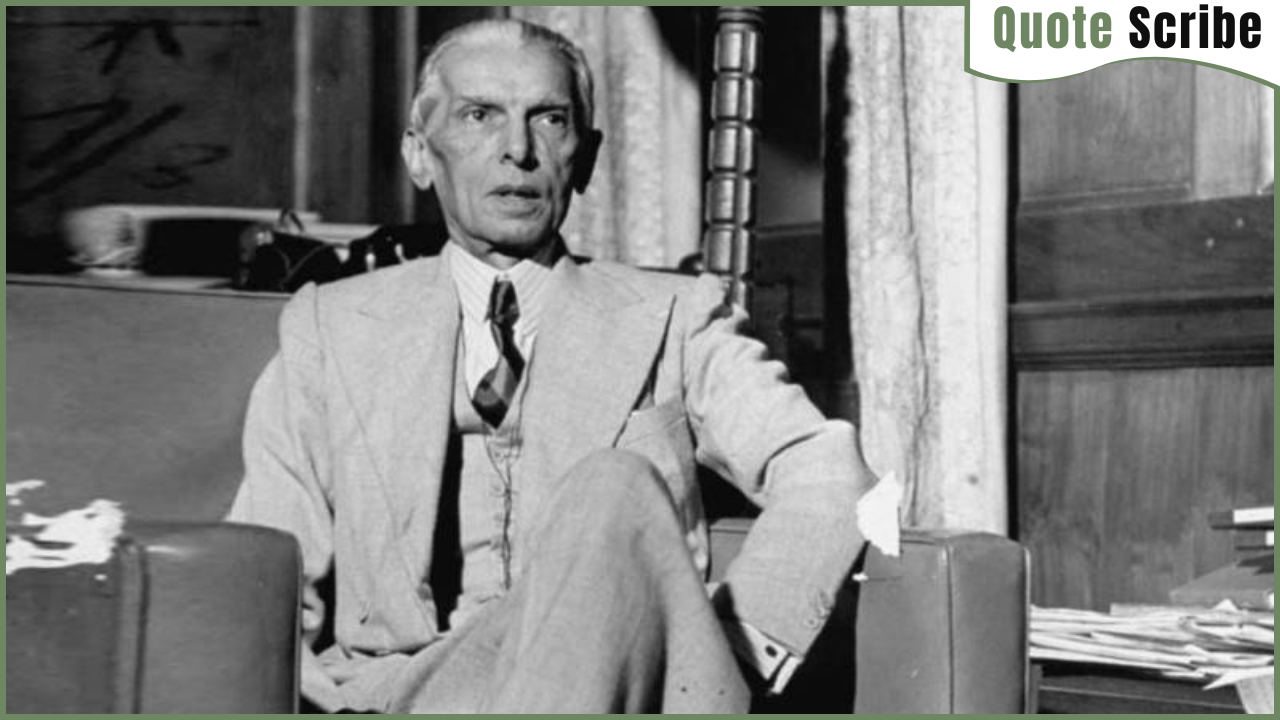Quaid-e-Azam Muhammad Ali Jinnah, the founder of Pakistan, was a visionary leader whose determination, wisdom, and unwavering commitment shaped a nation. Known for his sharp intellect and resolute spirit, Jinnah’s life offers timeless lessons for students striving for success, unity, and purpose.
This essay explores his journey, leadership, and enduring legacy, weaving in his most inspiring quotations to ignite your passion for learning and leadership.
From his early days to the creation of Pakistan, Jinnah’s story is a beacon for students aiming to make a difference.
Let’s dive into the life of the man who said, “With faith, discipline, and selfless devotion to duty, there is nothing worthwhile that you cannot achieve.” 🌟 Check More Here:- 250+ Deep Reality Gulzar Quotes on Life That Hit Hard
Early Life and Education
Born on December 25, 1876, in Karachi, Muhammad Ali Jinnah grew up in a modest family with a thirst for knowledge. His early education in Karachi and Bombay showcased his brilliance, but it was his time at Lincoln’s Inn in London, where he became a barrister at age 19, that shaped his disciplined mindset. Jinnah’s dedication to education resonates with students today, as he believed, “Education is a matter of life and death for our nation.” His academic journey teaches us that knowledge is the foundation of greatness, urging students to study hard and dream big. 📜
Jinnah’s early career as a lawyer in Bombay highlighted his commitment to justice and fairness. He faced challenges as a young professional in a competitive field but persevered with focus and integrity. His words, “Think a hundred times before you take a decision, but once that decision is taken, stand by it as one man,” inspire students to approach their studies with careful thought and unwavering resolve. His resilience in those formative years laid the groundwork for his monumental role in history. ✍️
Leadership and Vision
Jinnah’s leadership in the struggle for Pakistan was defined by his clarity of vision and unyielding determination. As a key figure in the All-India Muslim League, he advocated for the rights of Muslims in British India, uniting diverse communities under a single goal. His famous quote, “Unity, faith, and discipline are the three great principles that will lead us to success,” is a rallying cry for students to stay focused, work together, and remain steadfast in their goals. Jinnah’s ability to inspire millions teaches us the power of collective effort and clear purpose. 🦅
His leadership during the 1940s, particularly the Lahore Resolution of 1940, marked a turning point in the quest for Pakistan. Despite opposition, Jinnah remained resolute, stating, “No power on earth can prevent Pakistan.” This conviction inspires students to face academic and personal challenges with courage, reminding them that determination can overcome any obstacle. His strategic brilliance and calm demeanor under pressure are lessons in leadership for every aspiring student. ⚖️
The Struggle for Pakistan
The road to Pakistan’s creation in 1947 was fraught with challenges, from political negotiations to communal tensions. Jinnah’s tireless efforts in rallying support and negotiating with British and Indian leaders showcased his diplomatic genius. He once said, “I do not believe in taking the right decision; I take a decision and make it right.” This mindset encourages students to take initiative, trust their choices, and work hard to turn their decisions into successes, whether in exams or life. 🌟
Jinnah’s ability to unite people despite differences in language, culture, and background was remarkable. His words, “We are a nation with our own distinctive culture and civilization,” remind students to embrace diversity and work together for a common goal. For students facing group projects or leadership roles, Jinnah’s example shows that unity and respect can achieve greatness. His struggle teaches perseverance, as he declared, “Failure is a word unknown to me.” This is a powerful mantra for students tackling tough subjects or setbacks. 🇵🇰

Legacy and Inspiration
Quaid-e-Azam’s legacy as the Father of Pakistan endures through his vision of a united, progressive nation. His leadership transformed a dream into reality, leaving behind a nation built on principles of justice and equality. He urged, “You are free; you are free to go to your temples, you are free to go to your mosques or to any other place of worship in this State of Pakistan.” This call for tolerance inspires students to embrace inclusivity and fairness in their communities. 🖋️
Jinnah’s life also teaches the value of hard work and integrity. He advised, “Work, work, and more work is the key to success.” For students, this is a reminder that consistent effort in studies, projects, or personal growth yields results. His emphasis on discipline, as seen in “Discipline is the bridge between goals and accomplishment,” encourages students to stay focused, manage time wisely, and pursue their dreams relentlessly. His legacy is a call to action for young minds to lead with purpose and pride. ⚖️
Lessons for Students
Quaid-e-Azam’s life offers timeless lessons for students. His dedication to education underscores the importance of learning, as he said, “Without education, it is complete darkness, and with education, it is light.” This motivates students to value their studies as a path to enlightenment and success. His resilience in the face of adversity teaches us to push through challenges, whether it’s a tough exam or a personal setback. Jinnah’s words, “Expect the best, prepare for the worst,” encourage students to stay optimistic yet ready for obstacles. 🌟
His leadership also highlights the power of unity and collaboration. In group projects or team activities, students can draw inspiration from Jinnah’s ability to unite diverse groups. His quote, “We must work together as a team to achieve our goals,” is a reminder to value teamwork and mutual respect. Above all, Jinnah’s integrity and commitment to justice inspire students to live with honesty and stand up for what’s right, both in academics and life. 🇵🇰
Conclusion
Quaid-e-Azam Muhammad Ali Jinnah’s life is a testament to the power of vision, discipline, and resilience. His journey from a young student to the founder of Pakistan inspires students to dream big, work hard, and lead with integrity. His quotations, like “Success is never achieved by the size of our brain but by the strength of our will,” are a clarion call for young minds to pursue their goals with unwavering determination. Let Jinnah’s legacy fuel your academic journey and inspire you to make a difference, just as he did for millions. Want more inspiration? Check out our Leadership Quotes or Student Motivation Essays for extra fire! 🦅
Understanding the Intent Behind Quaid-e-Azam Quotes
Is It Motivational or Reflective?
Jinnah’s quotes carry distinct vibes. Some, like “With faith, discipline, and selfless devotion to duty, there is nothing worthwhile that you cannot achieve,” push for action, while others, like “We are a nation with our own distinctive culture and civilization,” invite reflection on identity. Ask: is the quote sparking motivation or encouraging deeper thought?
Motivational quotes suit study sessions or speeches; reflective ones fit essays or discussions. Choose based on your goal.
Considering the Context and Audience
Think about who’s reading. Students might vibe with “Work, work, and more work is the key to success,” while teachers love “Education is a matter of life and death for our nation.” Context matters—use these in essays, classroom talks, or patriotic events for impact.
Jinnah’s words resonate with students, educators, and patriots.
The Importance of Tone and Delivery
Tone shapes the message. A bold “No power on earth can prevent Pakistan” feels urgent, while “You are free; you are free to go to your temples” is calm and inclusive. Pair quotes with vibrant emojis (🇵🇰🦅) or passionate delivery to make them pop.
The right tone makes Jinnah’s wisdom inspire action.
Initial Emotional Response
Don’t Feel Overwhelmed (Even If It Feels Heavy)
Quotes like “Failure is a word unknown to me” can feel intense, especially if you’re facing setbacks. Don’t let them stress you—Jinnah’s words aim to uplift, not burden.
Embrace them as fuel for your academic and personal growth.
The Power of Pausing Before Dismissing
If a quote like “Discipline is the bridge between goals and accomplishment” feels daunting, pause before brushing it off. Reflect: does it spark a desire to push harder? A moment of thought can turn words into motivation.
Respond with curiosity, not rejection.
Funny and Light-Hearted Replies
Witty Comebacks That Show Spirit
If someone questions your hustle, channel Jinnah with humor:
“My study game’s got Quaid-level discipline!” “Chasing dreams like Jinnah chased Pakistan!” “My grind’s so strong, it’s Jinnah-approved!” These work in chats with friends who vibe with fun energy.
Sarcastic but Friendly Replies
For a sassy yet kind response, try:
“Oh, you’re chilling? I’m building a nation like Quaid!” “My brain’s too busy with Jinnah vibes to slack.” “Quaid energy only—catch up or step back!” Use these with folks who get your humor—keep it playful.
Confident and Assertive Responses
How to Stand Your Ground Respectfully
If someone doubts your effort, respond with Jinnah’s fire:
“I’m studying with Quaid’s discipline—join me?” “My goals are my Pakistan; I respect your path.” “I’m chasing success—happy to share the vibe!” These show confidence while staying open.
Turning Doubt Into a Teachable Moment
Use criticism to inspire:
“Think I’m too intense? Quaid would get it.” “Ever tried working with Jinnah’s focus? It’s epic.” “What’s stopping you from dreaming big?” These spark conversation and share your drive.
When Silence Is the Best Reply
If someone’s critique misses the mark, a nod and smile echo Jinnah’s resilience. Let your achievements speak louder than their doubts.
Silence shines when words won’t connect.
Reflective and Empathetic Replies
Acknowledging Feedback Without Feeling Attacked
If someone questions your focus, respond with grace:
“Thanks for sharing—I’m living Quaid’s vision.” “I hear you; discipline’s just my thing.” These show humility while owning your journey.
Asking Questions to Clarify Their Perspective
If their comment’s unclear, dig deeper:
“Do I seem too driven? I’m curious.” “What’s your take on chasing goals?” These invite dialogue and keep things positive.
When to Apologize and When Not To
Genuine Over-Apologizing: A Bad Habit to Break
Don’t apologize for your ambition just to please others. Saying “sorry” for your drive dims your light. Save apologies for when you unintentionally push your passion on others.
Understanding When an Apology Builds Bridges
If you came off too intense, a quick apology helps:
“Sorry if I went full Quaid on you—my bad.” “Didn’t mean to sound pushy—I just love this.” A sincere apology strengthens bonds.
Turning Criticism Into Self-Awareness
Checking Your Own Path
Reflect on your journey. Are you studying with Jinnah’s discipline, or just going through motions? Do you feel energized by your goals? Check: Are you consistent? Are others inspired?
Self-awareness sharpens your purpose.
Are You Overdoing or Underperforming?
Notice if you’re burning out or slacking off. If others feel overwhelmed by your intensity or unimpressed by your effort, adjust. Balance ambition with rest for sustainability.
How to Balance Effort and Rest
Try the 80/20 rule: 80% effort, 20% rest to recharge. Ask:
“Am I chasing my goals with joy or stress?” “How can I work smarter, like Quaid?” This keeps your drive vibrant and effective.
Handling Different Social Scenarios
At School or in Academic Settings
In classrooms, effort is judged by results. If questioned, say:
“My studies are Quaid-level—watch me soar.” “Thanks for the input—I’ll align my hustle for results.” Show your drive boosts performance without preaching.
With Friends or Family
In personal settings, ambition can feel intense. If doubted, try:
“I’m grinding like Quaid—wanna join?” “My goals are my Pakistan—let’s dream big together.” Show you value connection, not just ambition.
In Personal Goals or Studies
For personal goals, doubters can sting. Respond with:
“My hustle’s Quaid-inspired—my heart, my rules.” “I’m chasing my Pakistan, but I hear you.” Stay focused on your vision, not their doubts.
Common Mistakes to Avoid
Becoming Defensive
Snapping “I’m working harder than you!” shuts down growth. Stay calm and channel Jinnah’s grace.
Giving Up Out of Doubt
Don’t let doubters dim your fire. Refine your path with feedback, not abandonment.
Ignoring Valid Feedback
Dismissing critique misses growth. Listen, reflect, and act on what aligns with your goals.
Strategies to Prevent Doubt in the Future
Consistent Effort Practices
Show your drive daily through small actions. Study, plan, or lead with purpose to stay inspired.
Being Mindful of Impact and Perception
Notice how your ambition lands. Are others uplifted or overwhelmed? Adjust by asking:
“Is my drive sparking the right energy?” “How can I inspire like Quaid-e-Azam?”
Asking for Constructive Feedback
Seek input from trusted people:
“Am I chasing my goals the right way?” “Where can I improve my hustle?” This keeps your ambition sharp and relatable.
Embracing Your Leadership Journey
Why Ambition Isn’t a Flaw
Your drive, like Jinnah’s, is a superpower—it fuels success, leadership, and impact. Don’t shrink because someone doesn’t get it. Your goals are your Pakistan.
Famous People Inspired by Quaid-e-Azam
Leaders like Nelson Mandela and scholars like Stanley Wolpert (author of Jinnah of Pakistan) admired Jinnah’s vision. His legacy inspires global change-makers.
Building Leadership Confidence
Tools to Improve Your Journey
Level up your goals with:
- Setting clear academic targets
- Using planners for Jinnah-level discipline
- Joining leadership clubs for collaboration
- Tracking progress to see your growth
Next time you strive, focus on purpose and impact. Are you leading with passion? Are you inspiring others? Small tweaks make big wins.
FAQs
What are the best Quaid-e-Azam quotes for students?
Try “With faith, discipline, and selfless devotion to duty, there is nothing worthwhile that you cannot achieve” with a 🇵🇰 for motivation.
How can I use these quotes in essays?
Integrate “Education is a matter of life and death for our nation” with a 🖋️ for academic depth.
What’s a good quote for overcoming challenges?
Use “Failure is a word unknown to me” with a 🌟 for resilience.
How do I share these quotes on quotes sites?
Post “Work, work, and more work is the key to success” with a ⚖️ for universal appeal.
Can these quotes inspire leadership in students?
Absolutely! Try “Unity, faith, and discipline are the three great principles that will lead us to success” with a 🦅 for leadership vibes.




Leave a Comment